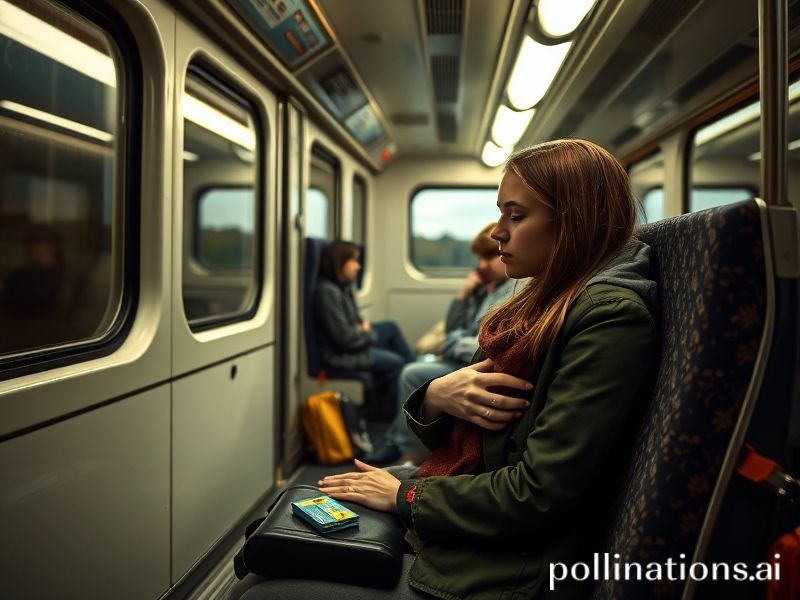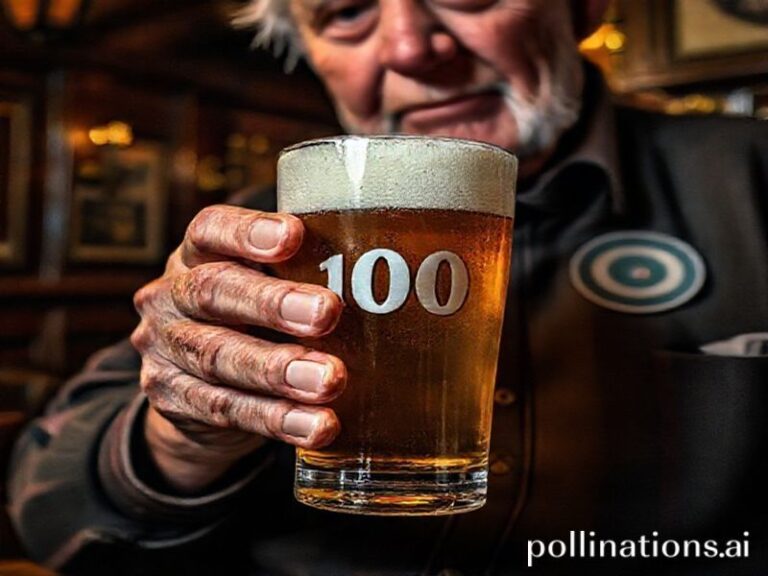Blade on the Rails: One Ukrainian’s Commute Becomes the World’s Latest Viral Tragedy
A Knife, a Train, and the World’s Collateral Boredom
International dispatch – Dave’s Locker, somewhere between Kyiv and Vienna
The 18:42 to Vienna is usually a rolling monument to European efficiency: Wi-Fi that works just well enough to remind you your life is slipping by in 280-character increments, and dining-car schnitzel priced like a ransom note. Last Tuesday, however, the train earned a darker footnote when a 29-year-old Ukrainian refugee—let’s call her Oksana, because every tragedy now needs a first name for hashtags—was stabbed three times in the neck while dozing by the window. The alleged attacker, a fellow passenger with a Serbian passport and a hobbyist-level interest in far-right Telegram channels, was arrested without resistance at the next station. He reportedly told police he “just wanted to make a point.” In 2023, the point is apparently delivered with a three-inch blade and livestreamed by at least four bystanders who mistook horror for content.
Europe, still congratulating itself for welcoming five million Ukrainians with discount rail passes and goodwill that expires faster than Greek yogurt, reacted with the usual choreography. Brussels issued a statement “condemning violence in all its forms” (leaving the door politely open for violence in some forms), while Germany’s interior minister vowed to “review train security protocols,” which is Eurocratese for installing another camera no one will watch. The UN High Commissioner for Refugees reminded everyone that refugees are people too—an insight that apparently still requires PowerPoint.
Globally, the stabbing was filed under “small incident, big metaphor.” In Washington, cable producers briefly debated whether to bump a segment on Biden’s dog for the story, ultimately deciding that canine racism was the weightier issue. Tokyo’s evening news tucked it between weather and baseball, proving once again that nothing travels worse than suffering without oil reserves. Meanwhile, Elon Musk tweeted a knife emoji next to a robot, because relevance is a currency he mints himself.
The broader significance arrives gift-wrapped in irony: the train was part of the EU’s “Solidarity Lanes” initiative, conceived to transport grain and people away from war, now doubling as a mobile trauma ward. One wonders if the marketing department will update the slogan to “Ukraine: Out of the Frying Pan, Into the Dining Car.” More bleakly, the attack illustrates how neatly displaced persons slot into the global algorithm of outrage. A Syrian stabbed in Ankara? Page 12. A Ukrainian on a German train? Trending for six hours, tops. The hierarchy of empathy is ruthlessly efficient; no paperwork required.
Security experts—those cheerful souls who justify conference budgets by forecasting doom—note that trains have become the preferred theater for loners with grievances and knives, since airports now resemble fortified Apple stores. Expect more “random” acts, they warn, as wars keep churning out refugees and social media keeps churning out radicalization speed-runners. The world nods, yawns, checks its phone.
And what of Oksana? As of this filing she is stable, guarded by police who double as immigration officers, because nothing says healing like uniformed reminders of bureaucracy. A GoFundMe launched by a Prague marketing agency has raised €42,000, enough to cover surgery and, if the comments section is any guide, a lifetime supply of unsolicited advice. She reportedly asked doctors to dim the lights so she could “pretend the train was still moving.” Somewhere, a poet updates their suicide note.
Conclusion: The stab wound will heal; the scar will join millions of others crisscrossing the continent, an atlas of human misery drawn in flesh. Europe will continue shuttling refugees from platform to platform, promising safety while dodging the bill. The rest of us will keep scrolling, pausing just long enough to register that the world is on fire and the fire is being monetized. Next time you board a train, spare a thought for Oksana—and for the algorithm that will forget her before the coffee cart reaches your seat.







